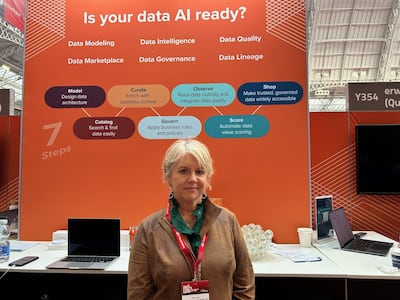The big concern in the data industry relates to quality. Simply put, data has to be good enough for AI to do its job.
One of the main messages to businesses coming out of this year's Big Data London conference is to 'ensure your data is in good, standardised working order, before considering applying AI tools to it'. Bad data, AI and analytics firms say, will just lead to bad results.
'Garbage in, garbage out'
“The foundation of good AI hinges heavily on good data quality,” Chandrashekar Lalapet Srinivas Prasanna (LSP), managing director of Zoho Canada, told The National. “It goes back to the cliché 'garbage in, garbage out'. So, there is good quality data, there is AI on top and there is contextualising it for your business.”
As such, businesses need to take steps to make sure their data is good and trustworthy before applying AI software. Otherwise, the results gleaned would be meaningless at best and misleading at worst. “You can't just run with AI from day one,” Mr Prasanna added.
Not all businesses will be aware of the vital step of readying their data for AI. Some go to companies such as Quest Solutions, which specialises in ensuring that data can be rationalised and structured.
“We do a lot in the financial and insurance sectors,” Susan Laine, the company's chief field technologist, told The National, “but now with AI, we're branching out a lot to manufacturers and so on. It's folks that want to get ahead with data, they want to innovate with data and monetise data.”

It is the speed of the advances in AI that the exhibiting companies at Big Data London, in the British capital's Olympia exhibition centre, are harnessing for applications for their business clients. They find that as the technology evolves it becomes a cost-effective tool that enables firms to get more out of the data they already have.
“We're not just seeing it as a measure to correct things and offer more services,” Sam Boulton, business development manager with Simpson Associates, told The National. “We're also seeing people now saying, 'We've spent all this time now on data lineage, we've got the data we need, we've got more data than we've ever had before, so let's start to use it to support our business strategy and get us to where we want to get to.'"

According to research firm Gartner, 70 per cent of AI programmes fail, because the data being fed in is not good enough. Essentially, AI sits on top of the data, and if the two are not compatible, then the process won't yield either expected or desirable results. “In fact, the AI programme is data,” Ms Laine said. “The most common misconception is that it's a bunch of code. It's not, it's a bunch of data behind AI.”
Building awareness among businesses of the need for good, “clean” and usable data was a theme of serious debate at Big Data London. Delegates agreed there was no way around it and it is an essential step that cannot be overlooked, missed or ignored.
“With anything new, people want to take shortcuts,” Ms Laine said. “So, they're going to want to get to it and get it out, but now they're finding that it takes a while to train a model and if you train the model on bad data and come out with nothing, that's going to set you back. So, they're going to learn soon that you can't skip the steps and the biggest step is ensuring that you have good, trusted data.”
'Dramatic swing to AI'
The market for artificial intelligence is set for even more impressive expansion in the coming years, Big Data London was told, with the conference chairman adding that generative AI (GenAI) is now “everywhere” and “inside every computer”.
“What a change we've had in the last year,” Mike Ferguson, managing director of Intelligent Business Strategies, said. “Still [venture capital investment in] data management is going up, but more money has gone into AI and analytics in the last 12 months than in the last five years combined - an absolutely dramatic swing towards AI.”
According to Precedence Research, the size of the AI market in 2024 will be $638 billion, but by 2030 it could be worth more than $1.8 trillion. Between 2018 and this year, the top 15 analytics and AI software vendors in the world attracted $19.9 billion in venture capital investment. “That number of over $19 billion, was $9.5 billion last year,” Mr Ferguson said.
Success is evident in the mainstream as well, and not just for the industry firms Microsoft and Google. Shares in Oracle have risen 60 per cent this year, as the company builds itself a reputation in the GenAI arena.
The Big Data London conference was told that not only is GenAI now baked into database management systems, tools, services, applications and processes, but new themes and developments are emerging such as AI agents, as well as decision intelligence for decision automation.

Deemed as being one of the next steps in AI development, AI agents are software programmes that interact with their environments, collect data and use the data to reach human-determined goals, but through self-determined tasks. While a human sets the goal, the AI can select how that goal is achieved.
“Expectations are raised even higher by the emergence of the new kid on the block – AI agents, which are very, very new and are still evolving here, so expect things to change rapidly,” Mr Ferguson said.


